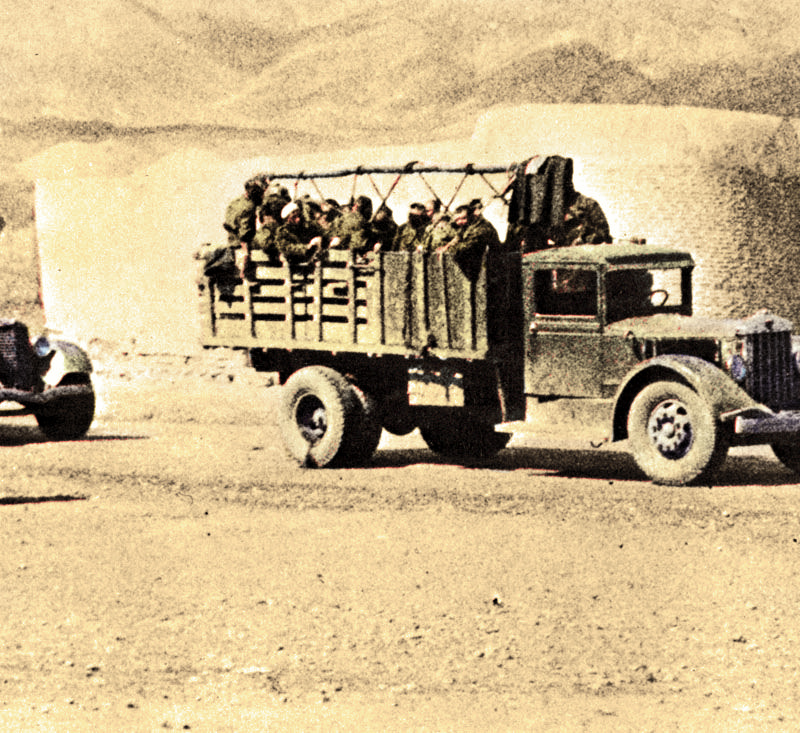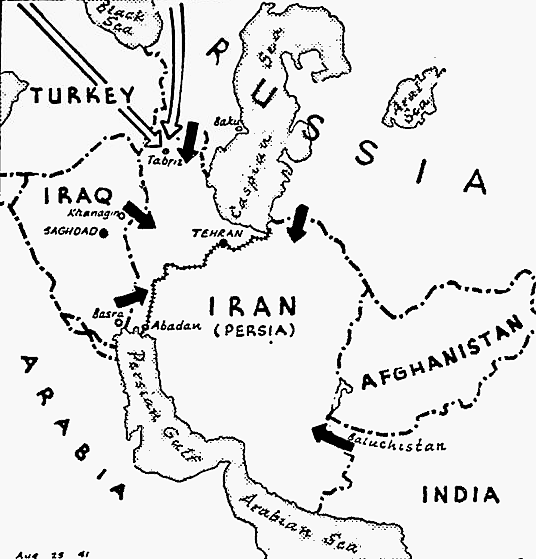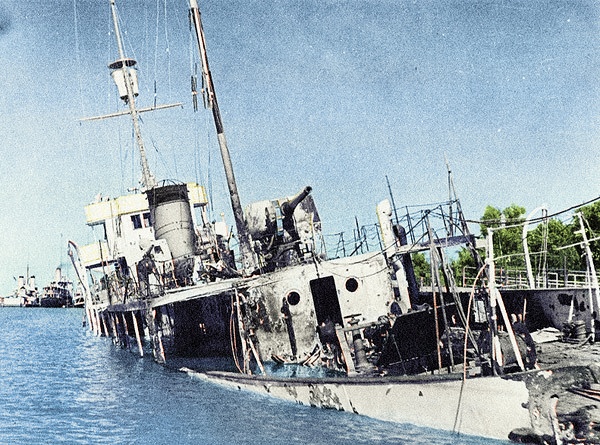The Pittsburgh Press (August 25, 1941)
IRANIAN TROOPS RESIST INVASION BY BRITISH AND SOVIET ARMIES
…
British meet resistance in invasion of Iran
…
By Edward W. Beattie, United Press staff writer

Soviet troops crossing the Iranian border.

Routes of entry into Iran – The British and Russians moved into Iran today from the directions shown by arrows on the map above. The Red Army moved down along both sides of the Caspian Sea as the British marched in from India and Iraq. The British landed troops by sea at Abadan and seized the railroad linking the Persian Gulf and the Caspian Sea. If Germany seeks to send armies into Iran, they must move from Bulgaria through Turkey or from the Ukraine around the Black Sea.
London, Aug. 25 –
British and Russian armed forced struck into Iran without warning today and were reported meeting resistance in their campaign to oust German agents and protect the Red Army’s oil fields and supply lines.
Authoritative British sources said that the Imperial forces, consisting of troops from the British Isles and India, had encountered opposition in the first stage of the invasion, which included the landing of forces from British ships at the head of the Persian Gulf.
According to the statement made here:
Resistance has been encountered but it is not known where or how serious it is.
The forces landed from ships in the Bandar Shahpur sector of the Persian Gulf were said to be advancing but it was not known how far they had penetrated from the coast.
Bandar Shahpur is the gulf terminus of the railroad to Ahvaz and Tehran.
The British sea landing at Bandar Shahpur as well as the mechanized land advance from Iraq were designed to move quickly into Iranian oil centers, as well as to secure the main railroad line over which supplies from America and elsewhere might be sent to Russia.
An advance of around 100 miles would put the British in control of the main oil centers. Russian forces moving down from the Caspian and other British units from India supplemented the main attack.
Authorities said the entire Iranian Army probably did not exceed 150,000 men, including one armored brigade with tanks (apparently of Czech origin) and two or three well-trained and well-equipped infantry divisions.
Through the Foreign Office at Moscow, Iran was informed that the Russian and British forces were moving in and was given assurances that they had no designs on Iran and would get out as soon as the danger of a German coup had been removed.
In Moscow, it was reported officially that the Red Army marched down the shores of the Caspian Sea into Iran as the British marched from Iraq and India.
Announcement of the first big joint Russo-British military operation of the war, a little more than two months after Germany attacked Russia June 22, was made by the Moscow radio, in a broadcast picked up here by the United Press listening post, and was later confirmed by the British government.
British troops marched into southern Iran under the supreme command of General Sir Archibald Wavell, Commander-in-Chief of India, it was said authoritatively.
Foreign Minister Vyacheslav Molotov of Russia and Sir Stafford Cripps, British Ambassador to Russia, handed the Iranian Ambassador at Moscow similar notes announcing it and justifying it on the ground that German agents, who had filtered into almost every key communication and industrial enterprises, constituted a grave danger to Russia, to Britain and to the Iranian government itself.
Simultaneously, the Russian Ambassador and the British Minister at Tehran handed the Iranian Foreign Office copies of the notes presented to the Iranian Ambassador at Moscow.
The Russo-British action had been expected.
Turkey had reported British troops waiting to cross the west-central part of the Iranian frontier from the Khanaqin area, from Basra in the Persian Gulf, and from the Balochistan frontier of India. There had been reports that four Indian divisions, possibly as many as 60,000 troops, were concentrated on the Balochistan frontier as a striking force.
Dispatches from Tehran said members of the German legation had spent the weekend preparing to evacuate their families. Americans and Britons had been warned to assemble at the American and British legations, in the suburbs, on short notice of rioting broke out in Tehran.
The dispatches reported Tehran calm but said truck columns and troop trains were moving from the city, mostly to the south, with reinforcements of troops and materials for the frontier area. Cairo reported recruiting going on everywhere.
Britain and Russia had left no doubt that they regarded the presence of thousands of German agents in Iran an urgent danger, especially in view of the possibility of a German march through the Ukraine to and beyond the Don Basin and of a German demand on Turkey for troop facilities to attack the Russian Caucasus oil fields. Turkey, nominally allied with Britain, had given increasing indications that it would not fight even to resist a German attack.
Of vital importance to Russia was the railroad which crosses Iran to link the Caspian Sea and the Persian Gulf, held by the British fleet. The railroad was important to Britain as the link with the British-controlled Anglo-Persian oil field, largest single field in the world. The British and Russians want to take the railroad intact and it was believed they had used airborne troops to do so.
The Foreign Office, announcing Britain’s own action, said:
The reply of the Iranian government to communications addressed to them Aug. 16 shows that they were not prepared to give adequate satisfaction to the recommendations of His Majesty’s Government and the Soviet government.
It is now clear that further friendly representations to the Iranian government along the same lines as hitherto would serve no useful purpose and that His Majesty’s Government must have recourse to other measures to safeguard essential interests.
These measures will in no way be directed against the Iranian people: His Majesty’s Government have no designs on the independence or territorial integrity of Iran and any measures they may take will be directed solely against attempts of the Axis powers to establish their control of Iran.
The Foreign Office said Iran had been reluctant to offend the German government:
…even in defense of their own vital interests.
The Foreign Office disclosed that as a last resort Britain and Russia had proposed that Iran retain temporarily a few German technicians engaged in especially important work while Britain and Russia aided Iran by finding suitable experts to replace ousted German technicians.
The Moscow radio, announcing Foreign Commissar Molotov’s note to the Iranian Ambassador said:
The Soviet government has undertaken the necessary steps in conformity with Article VI of the Russo-Iranian Treaty of 1921, which the Soviet government is now justified in invoking for its self-defense.
This treaty was that of Feb. 26, 1921, under which Russian troops are given the right to enter Iran if Iranian territory is used as a base for the preparation of hostile action by a third power.
Molotov’s note said:
The Soviet government had ordered its troops to march into Iran. This measure is not directed against the Iranian people and the Soviet Union has no claims which reflect on the integrity and independence of Iran.
Russian military measures are directed against the danger created by German agents. As soon as the danger which is threatening the interests of Iran and Soviet Russia has been eliminated, Soviet troops in accordance with the obligations of the Treaty of 1921 will immediately be withdrawn beyond the frontiers of Iran.


